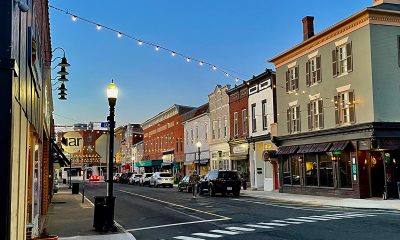Local
O’Malley, Hoyer attend pro-Question 6 rally
Roughly 200 students joined elected officials and others in College Park
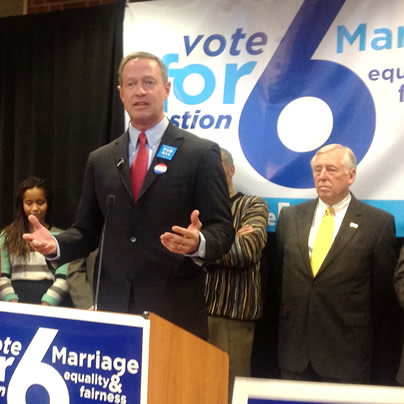
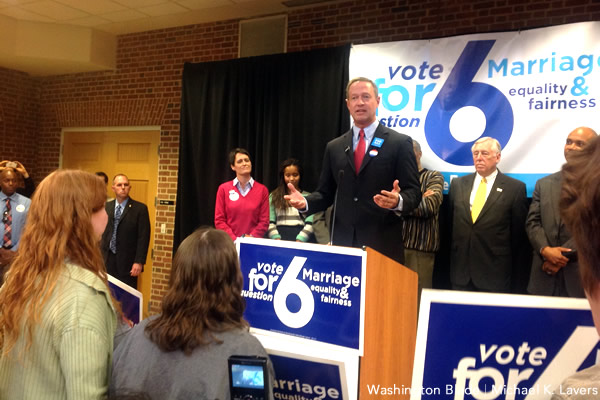
Governor Martin O’Malley speaks at a pro-Question 6 rally at the University of Maryland in College Park on Nov. 5 (Washington Blade photo by Michael K. Lavers)
COLLEGE PARK, Md.—Maryland Gov. Martin O’Malley on Monday urged young people to vote for the state’s same-sex marriage law on Election Day.
“Tomorrow we’re going to put the ‘for’ in forward,” he told roughly 200 people who attended a pro-Question 6 rally at the University of Maryland. The governor also spoke at a similar event earlier in the day in Baltimore. “As a country we move forward and not back. I have four kids — and my daughters are no longer kids, they’re your age. They’re 21 and 20. And when it comes to Question 6, they look at some of us older people — that is to say those over 40 — and they say, what is wrong with you guys? What about this thing do you not get? Every person should be treated fairly and equally under the law. That’s what it means to be an American, isn’t it?”
House Minority Whip Steny Hoyer (D-Md.,) whose daughter Stefany came out to the Washington Blade in an interview in June, pointed out the first bill for which he voted in the Maryland state Senate was the measure that repealed the state’s ban on interracial marriages. He said marriage rights for gays and lesbians upholds the promises of life, liberty and the pursuit of happiness outlined in the Declaration of Independence.
“There is zero doubt in my mind that who you love or others love will not impede on who I love or who I have a relationship with or the values that I hold,” said Hoyer. “This is about the substance of America and every individual is endowed not by their government but by their God with certain unalienable rights.”
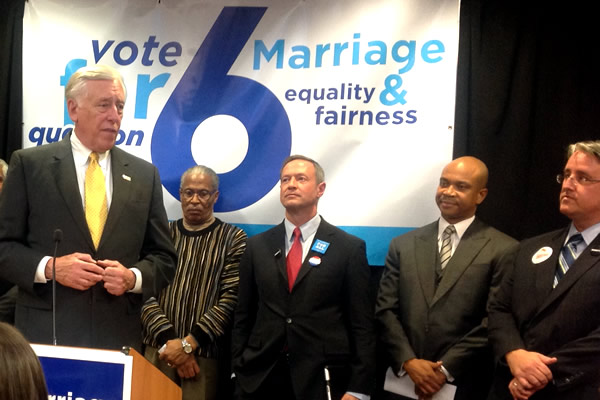
House Minority Whip Steny Hoyer speaks at pro-Question 6 rally at the University of Maryland in College Park on Nov. 5. (Washington Blade photo by Michael K. Lavers)
Kiese Hanson of the University of Maryland Student Government Association also urged her classmates to vote for Question 6.
“My parents raised me to believe that there should not be boundaries put on love, and I learned that everyone should be treated fairly and equally,” she said. “The best quality of the human race is our ability to love. Why would we restrict those from demonstrating this quality of our existence? Maryland has the opportunity to do something special to be the first state to pass marriage equality at the ballot and guarantee that no one in our state is restricted from loving who they want to love.”
A Goucher College poll released on Oct. 29 found 55 percent of Marylanders support marriage rights for same-sex couples in the state, compared to 39 percent who oppose them. A Washington Post survey published on Oct. 18 noted 52 percent of Maryland voters support Question 6, compared to 42 percent who said they oppose it.
A third poll the Baltimore Sun conducted between Oct. 20-23 noted only 46 percent of respondents would vote for the law O’Malley signed in March.
Question 6 opponents continue to maintain the same-sex marriage law O’Malley signed in March does not protect religious freedom. Peter Sprigg of the Family Research Council and others argue marriage between one man and one woman is necessary to produce children.
“As a pastor, I cannot stand on the side of those who would attempt to justify legalized discrimination under the guise of religious belief,” said Rev. Delman Coates of Mount Ennon Baptist Church in Clinton. “The denial of rights to some based upon religious beliefs sets the precedent for the denial of rights to others based on religious belief. And that is a very dangerous public policy precedent to establish in America. As a Christian and as an American, I believe my charge is to live in my faith, not to legislate it. And I therefore urge Marylanders to vote for Question 6 because it does not force any religious institution or any clergyperson to perform any union that is against their religious beliefs or practices.”
State Sen. Allan Kittleman (R-Howard and Carroll Counties) stressed he feels nuptials for gays and lesbians is increasingly becoming a bi-partisan issue. He is one of two GOP lawmakers who voted for the same-sex marriage bill in Annapolis earlier this year.
“I see it as a very Republican principle,” said Kittleman. “I believe conservative principles mean that gov’t should not be intruding on your personal freedoms.”
Maryland voters on Election Day will also consider three other ballot questions that would allow undocumented immigrants to pay in-state tuition at public colleges and universities, expand gambling and approve redrawn congressional districts.
O’Malley’s office did not return the Washington Blade’s request for comment on a state campaign finance report that indicates the company behind the development of National Harbor in Prince George’s County donated $271,515 to a group opposed to both Question 6 and the Dream Act. The governor continues to maintain expanded gambling in the state would generate more jobs and money for education.
Back at the University of Maryland, gay state Sen. Rich Madaleno (D-Montgomery County) thanked O’Malley for his efforts in support of Question 6.
“He has worked day and night to make sure not only Question 6, but all of the ballot questions succeed tomorrow in Annapolis,” he said. “I can’t tell you on behalf of my family, my kids, all the gay and lesbian families of our state, your work has been truly amazing. And we will never adequately express our gratitude for you.”
Lesbian state Del. Heather Mizeur (D-Montgomery County) and Bob Ross, president of the National Association for the Advancement of Colored People’s Prince George’s County Branch were among those who also attended the rally.
“We’re here because it’s time to right a wrong,” said NAACP Washington Bureau Director Hilary Shelton. “It’s time for us to take the issue on head first.”
Maryland
Silver Spring holds annual Pride In The Plaza
‘Today means inclusion. It means to build resilience’

Silver Spring’s annual Pride in the Plaza event took place on Sunday to celebrate the LGBTQ community and emphasize inclusion and resilience.
“Today means inclusion. It means to build resilience, love,” Robyn Woods, program and outreach director for Live In Your Truth, which organized the event, said. “I mean, just being surrounded by the community and so many great entrepreneurs, business owners, and just being a part of this whole rainbow coalition that we call the LGBTQIA to be about.”
With the event being her first time organizing for Live In Your Truth, Woods said she felt emotional to see the support and love at the event.
“Some people (are) bringing out their children, their babies, their grandparents,” Woods said. “It’s a lot more allies here than anything else. That type of support to me means so much more than just support from my community; just outside support, inside support, so much support around it, so much love. Everyone’s smiling outside, helping each other.”
Attendees of the event were able to head over to the Family Fun Zone, an air-conditioned Pride Cool Down Lounge, or watch live drag performances in the main stage area.
Along with entertainment and a shaved-ice stand, rows of information tables stood along the plaza, including FreeState Justice, the Washington Spirit, Trans Maryland, Moco Pride Center, and the Heartwood Program, an organization that offers support, therapy, education, and resources to the LGBTQ community.
“I want people to know about our services, and I love what we have to offer,” Jessica Simon, psychotherapist for Heartwood Program’s Gender Wellness Clinic, said. “I (also) want to be part of a celebration with the community, and so it feels good to be here with other people who have something they want to give to the community.”
She added that within today’s political climate, to which she called an “antidote to shame,” it’s important to be celebrating Pride.
“There’s a lot of demonization of LGBTQI people,” Siena Iacuvazzi, facilitator for Maryland Trans Unity, said. “(Pride) is part of the healing process.”
Iacuvazzi said she was taught to be ashamed of who she was growing up, but being a part of a community helped her flourish in the future.
“I was taught how to hate myself. I was taught that I was an abomination to God,” she said. “But being a community is like understanding that there are people who have experienced the same thing, and they’re flourishing. They’re flourishing because they’re willing to stand up for themselves as human beings and discover themselves and understand what’s true for themselves.”
She added that Pride allows for a mutual understanding to take place.
“It’s more of a sense of belonging … and just taking that home and understanding you’re not alone,” Iacuvazzi said. “We’re each taking our own journey — we’re not putting that on each other. It’s just walking away with a sense of belonging and humanity.”
Similar to Iacuvazzi, Woods said she hopes attendees’ biggest takeaways would be family, fun, resilience, and pride.
“Being proud of yourself, being happy for who you are, and representation and how much it matters,” she continued. “And I think all these young people that are walking around here get to see versions of themselves, but older. They get to see so many different lesbian, gay, bisexual, pansexual people that are successful, that are showing love, that care, and it’s not how we’re portrayed in the media. It’s lovely to see it out here. (It’s) like we’re one big old, happy family.”
Virginia
Spanberger touts equality, reproductive rights in Arlington
Democratic Va. gubernatorial nominee made campaign stop at Freddie’s Beach Bar
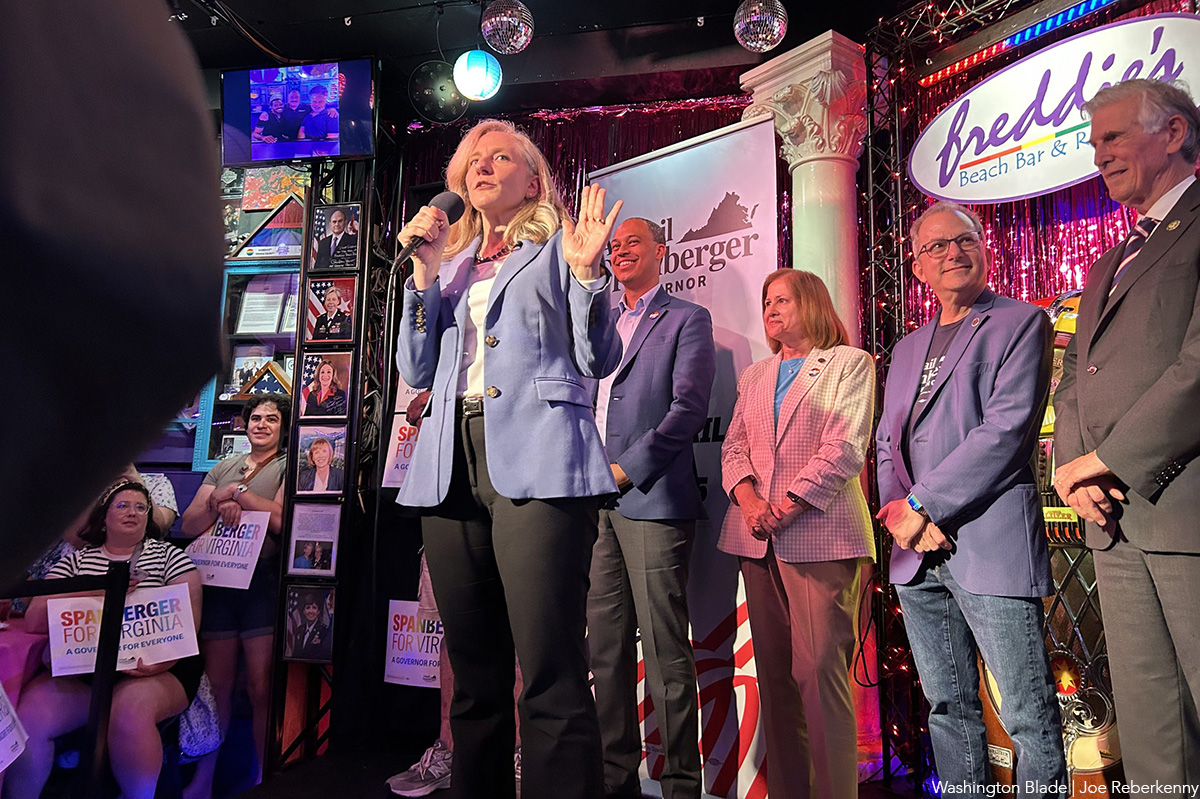
With the general election heating up and LGBTQ rights under increasing threat nationwide, Virginia gubernatorial candidate Abigail Spanberger brought her “Span Virginia Bus Tour” to Arlington’s Freddie’s Beach Bar for a campaign stop filled with cheers, policy pledges, and community spirit.
Spanberger, who served three terms in the U.S. House of Representatives from 2019 through early 2025 for Virginia’s 7th Congressional District, also served as a federal law enforcement officer specializing in narcotics and money laundering cases, and as a CIA case officer working on counterterrorism and nuclear counterproliferation.
Spanberger is running against Republican nominee Winsome Earle-Sears, the current lieutenant governor of Virginia, who said she was “morally opposed” to a bill protecting marriage equality in the commonwealth.
She was joined by other Democratic candidates and supporters: lieutenant gubernatorial candidate Ghazala Hashmi, attorney general candidate Jay Jones, Virginia state Sen. Adam Ebbin (D-Alexandria), and Congressman Don Beyer.
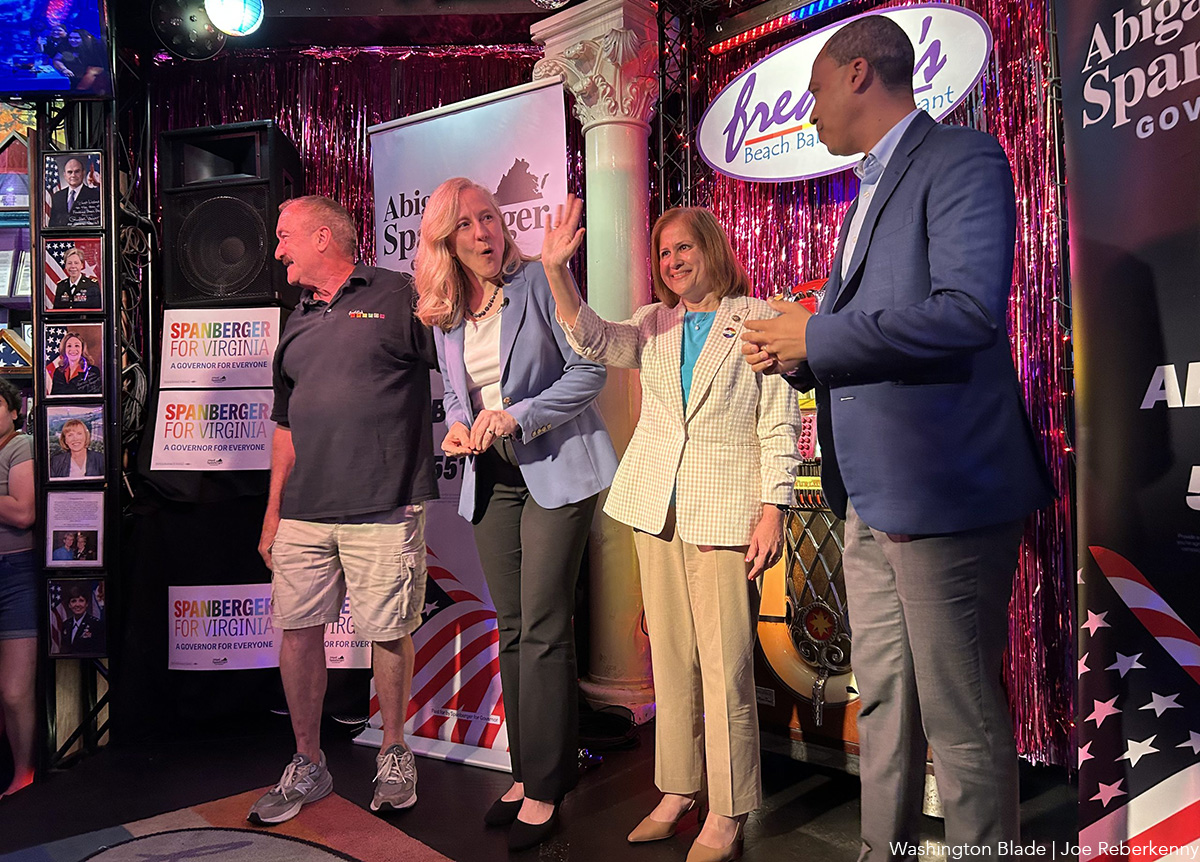
Freddie’s was packed wall-to-wall with supporters, many of whom wore “Spanberger for Virginia” shirts in the progressive Pride flag colors. In her speech, she made it clear that LGBTQ Virginians’ rights are on the ballot this year.
“I’m so excited to be here, and I am so grateful to the entire staff of Freddy’s for letting us overtake this incredible venue that is not just an awesome place to come together in community, but is a symbol to so many people of joy, of happiness, of community and of celebrating our friends and our neighbors,” Spanberger told the packed restaurant. “It is exciting to be here, and particularly during this Pride month, and particularly as we reflect on the 10-year anniversary of Obergefell and the reality that we still have so much work to do.”
“The reality is there are so many people who still would be inclined to take us backwards,” she said. “In this moment when we see attacks on people’s rights, on people’s humanity, on Virginia, on our economy, on research, on public education, on food security, on health care, on Virginians, on their jobs, on public service and on people — it can get heavy.”
“What it does for me is it makes me want to double down, because once upon a time, when I was talking to my mother about some horror show or sequence of activities coming out of a particular administration, she did not really have the patience to listen to me and said ‘Abigail, let your rage fuel you’ — and the conversation was over. And so I reflect on that, because, in fact, every day there is so much fuel to be had in this world and in this moment.”
One of the points Spanberger continued to emphasize was the importance of steadfast state government officials following the election of President Donald Trump, which has led to rollbacks of LGBTQ and bodily autonomy rights as a result of the conservative-majority U.S. Supreme Court.
“What the past few years have shown us is that a Supreme Court decision, no matter how many years we have celebrated its existence, does not protect us in the long term. And so as governor, I will work to make sure that every protection we can put in place for the dignity, the value, and the equal rights of all Virginians is a priority.”
During her speech, Spanberger highlighted several of the key values driving her campaign — protecting reproductive freedom and human rights, lowering healthcare costs, safeguarding Virginia’s environment, and ensuring that public education is affordable, accessible, and rooted in truth, not politics.
Spanberger went as far as to say that she wants to amend the state’s constitution to remove Section 15-A. “The reality is that in Virginia, we still have a ban in our state constitution on marriage equality. It is of the utmost urgency that we move forward with our constitutional amendment.”
“We will work to ensure that that terrible constitutional amendment, that was put in years ago, is taken out and updated and ensuring that Virginia is reflective in our most essential documents of who we are as a commonwealth, which is an accepting place that celebrates the vibrancy of every single person and recognizes that all Virginians have a place, both in that constitution and in law,” she added.
Following the event, two supporters spoke to the Washington Blade about why they had come out to support Spanberger.
“I came out because I needed to show support for this ticket, because it has been a particularly rough week, but a long few years for our rights in this country, in this state, with this governor, and it’s — we need to flip it around, because queer people need protection,” said Samantha Perez, who lives in Ballston. “Trans people need protection. Trans kids need protection. And it’s not gonna happen with who’s in Richmond right now, and we just need to get it turned around.”
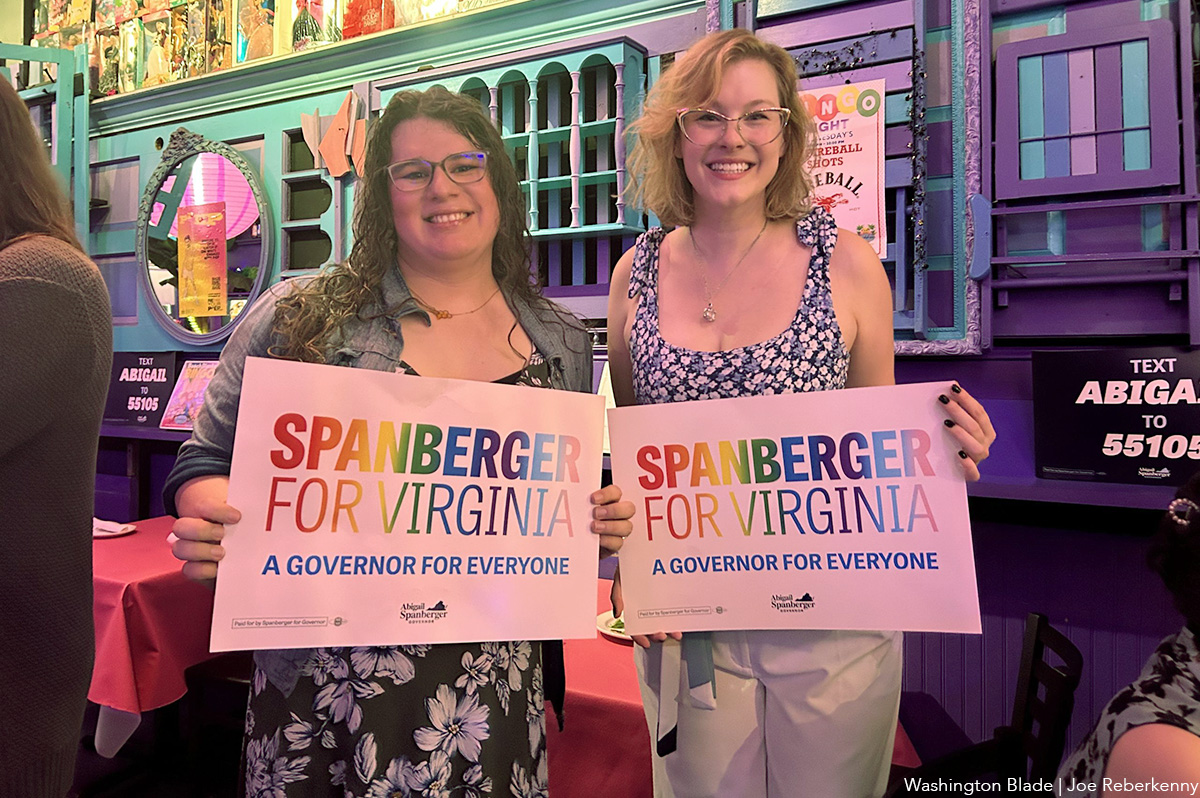
“The whole neighborhood’s here. All our friends are here,” said Annie Styles of Pentagon City. “It means the world to me to take care of each other. That’s what a good community does. That’s not what we’ve had with the Republicans here or across the nation for a really long time. It’s time to show that care. It’s time to make sure that good people are in a position to do good things.”
District of Columbia
Activists protest outside Hungarian Embassy in DC
Budapest Pride scheduled to take place Saturday, despite ban

More than two dozen activists gathered in front of the Hungarian Embassy in D.C. on Friday to protest the country’s ban on Budapest Pride and other LGBTQ-specific events.
Amnesty International USA Executive Director Paul O’Brien read a letter that Dávid Vig, executive director of Amnesty International Hungary, wrote.
“For 30 years Budapest Pride has been a celebration of hope, courage, and love,” said Vig in the letter that O’Brien read. “Each march through the streets of Budapest has been a powerful testament to the resilience of those who dare to demand equality, but a new law threatens to erase Pride and silence everyone who demands equal rights for LGBTI people.”
“The Hungarian government’s relentless campaign against LGBTI rights represents a worrying trend that can spread normalizing division and hatred,” added Vig. “Thank you for standing with us when we refuse to be intimidated.”
Council for Global Equality Chair Mark Bromley and two of his colleagues — Stephen Leonelli and Keifer Buckingham — also spoke. Health GAP Executive Director Asia Russell and Chloe Schwenke, a political appointee in the Obama-Biden administration who worked for the U.S. Agency for International Development, and Planned Parenthood staffers are among those who attended the protest.
(Washington Blade video by Michael K. Lavers)
Hungarian lawmakers in March passed a bill that bans Pride events and allow authorities to use facial recognition technology to identify those who participate in them. MPs in April amended the Hungarian constitution to ban public LGBTQ events.
Budapest Pride is scheduled to take place on Saturday, despite the ban. Hundreds of European lawmakers are expected to participate.
“Sending strength to the patriotic Hungarians marching tomorrow to advance human dignity and fundamental rights in a country they love,” said David Pressman, the gay former U.S. Ambassador to Hungary, on Friday on social media.
Sending strength to the patriotic Hungarians marching tomorrow to advance human dignity and fundamental rights in a country they love. Szabadság és szerelem. My past remarks on Budapest Pride: https://t.co/y1QhA9QouA
— David Pressman (@AmbPressman) June 27, 2025
-

 U.S. Supreme Court4 days ago
U.S. Supreme Court4 days agoSupreme Court upholds ACA rule that makes PrEP, other preventative care free
-

 U.S. Supreme Court4 days ago
U.S. Supreme Court4 days agoSupreme Court rules parents must have option to opt children out of LGBTQ-specific lessons
-

 National5 days ago
National5 days agoEvan Wolfson on the 10-year legacy of marriage equality
-

 Congress5 days ago
Congress5 days agoSenate parliamentarian orders removal of gender-affirming care ban from GOP reconciliation bill





